Bring your own device to work policy (Iowa): Free template

Bring your own device to work policy (Iowa)
A bring your own device (BYOD) policy helps Iowa businesses manage the use of personal devices such as smartphones, tablets, and laptops for work-related tasks. Allowing employees to use their own devices can increase flexibility and productivity but also requires guidelines to protect business data and ensure secure access to company systems.
This policy outlines the rules for using personal devices for work, including security requirements, acceptable use guidelines, and responsibilities for maintenance and support. It helps businesses balance convenience with risk management while safeguarding company information.
By implementing this policy, businesses in Iowa can enhance operational efficiency, improve employee satisfaction, and protect sensitive business data.
How to use this bring your own device to work policy (Iowa)
- Define eligible devices: Specify which types of personal devices employees can use for work purposes.
- Establish security requirements: Require employees to enable device encryption, use strong passwords, and install security updates.
- Set acceptable use guidelines: Clarify which work-related activities employees can perform on personal devices and any restricted applications or websites.
- Implement data protection measures: Outline steps to protect sensitive company information, including remote wipe capabilities if a device is lost or stolen.
- Address technical support limitations: Inform employees of the level of IT support available for personal devices.
- Clarify cost responsibilities: Specify which costs, such as data plans or device repairs, are covered by the business and which are the employee’s responsibility.
- Establish monitoring and compliance expectations: Define how businesses will monitor device usage and enforce security policies.
- Review and update: Regularly assess the policy to adapt to evolving technology and security threats.
Benefits of using this bring your own device to work policy (Iowa)
This policy offers several advantages for Iowa businesses:
- Increases flexibility: Allows employees to use familiar devices for work tasks.
- Enhances productivity: Reduces reliance on company-provided hardware and streamlines remote work capabilities.
- Improves cost efficiency: Lowers business expenses by minimizing the need for additional company-owned devices.
- Strengthens data security: Establishes clear guidelines for protecting business information.
- Supports remote work: Enables employees to stay connected and work efficiently from different locations.
- Encourages responsible device usage: Provides employees with clear expectations for work-related activities on personal devices.
Tips for using this bring your own device to work policy (Iowa)
- Require security measures: Businesses should mandate encryption, passwords, and security software on personal devices used for work.
- Limit access to sensitive data: Businesses should restrict access to critical business information on personal devices.
- Establish remote wipe protocols: Businesses should implement procedures to erase business data from lost or stolen devices.
- Communicate usage guidelines: Businesses should clearly define acceptable work-related activities on personal devices.
- Review legal and tax implications: Businesses should assess whether BYOD usage impacts employment policies or tax reporting.
- Update policies regularly: Businesses should adjust BYOD guidelines as technology and security risks evolve.
Q: Why should Iowa businesses implement a bring your own device policy?
A: Businesses should implement this policy to enhance flexibility, increase productivity, and protect company data while allowing employees to use personal devices for work.
Q: What security measures should businesses require for personal devices?
A: Businesses should require encryption, password protection, remote wipe capabilities, and regular software updates.
Q: Can businesses restrict what employees do on personal devices during work hours?
A: Businesses should set clear guidelines on acceptable work-related activities and prohibit unauthorized use of company data.
Q: How should businesses handle lost or stolen personal devices with work data?
A: Businesses should implement remote wipe procedures and require employees to report lost devices immediately.
Q: Who is responsible for the costs associated with using personal devices for work?
A: Businesses should clarify whether they will reimburse expenses such as data plans, device repairs, or security software.
Q: How can businesses ensure that BYOD practices do not compromise security?
A: Businesses should implement strong authentication methods, limit access to sensitive systems, and provide cybersecurity training.
Q: How often should businesses review their BYOD policy?
A: Businesses should review and update the policy annually or as technology and security risks change.
Q: Should businesses provide IT support for personal devices?
A: Businesses should decide whether to offer limited IT support or require employees to manage their own devices.
This article contains general legal information and does not contain legal advice. Cobrief is not a law firm or a substitute for an attorney or law firm. The law is complex and changes often. For legal advice, please ask a lawyer.


